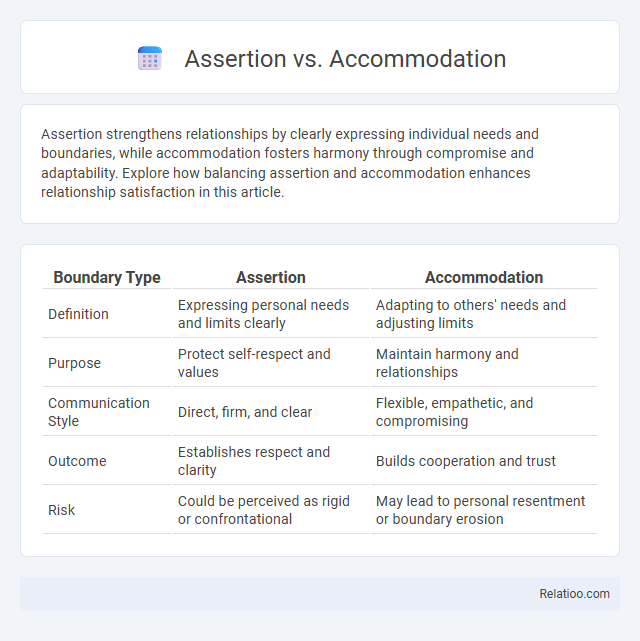Assertion strengthens relationships by clearly expressing individual needs and boundaries, while accommodation fosters harmony through compromise and adaptability. Explore how balancing assertion and accommodation enhances relationship satisfaction in this article.
Table of Comparison
| Boundary Type | Assertion | Accommodation |
|---|---|---|
| Definition | Expressing personal needs and limits clearly | Adapting to others' needs and adjusting limits |
| Purpose | Protect self-respect and values | Maintain harmony and relationships |
| Communication Style | Direct, firm, and clear | Flexible, empathetic, and compromising |
| Outcome | Establishes respect and clarity | Builds cooperation and trust |
| Risk | Could be perceived as rigid or confrontational | May lead to personal resentment or boundary erosion |
Definition of Assertion and Accommodation
Assertion involves confidently stating a belief or claim as true based on evidence or reasoning, reflecting an active commitment to a particular viewpoint. Accommodation refers to adjusting existing cognitive frameworks or beliefs to incorporate new information or experiences that do not fit previous understandings. Distinguishing Assertion from Accommodation highlights the contrast between affirming a position (assertion) and adapting to novel information through mental restructuring (accommodation).
Key Differences Between Assertion and Accommodation
Assertion involves confidently stating or defending your own beliefs or rights, emphasizing self-assurance and independence. Accommodation requires adjusting your stance or behavior to meet others' needs or expectations, highlighting flexibility and cooperation. Your understanding of these concepts helps navigate social interactions by balancing personal conviction with relational harmony.
When to Use Assertion in Conflict Resolution
Use assertion in conflict resolution when clearly expressing your needs, rights, or opinions without aggression or passivity to maintain respect and clarity. This approach helps prevent misunderstandings and promotes effective communication by focusing on your perspective while acknowledging others. Your ability to assertively communicate boundaries fosters mutual respect and facilitates constructive solutions.
Situations Favoring Accommodation
Situations favoring accommodation often arise when maintaining harmony and avoiding conflict outweigh the importance of asserting your own viewpoint. In scenarios where relationships are more valuable than the immediate issue, accommodation allows for preserving goodwill and fostering cooperation. Your willingness to yield can facilitate resolution when the other party's position has stronger merit or urgency.
Advantages of Being Assertive
Being assertive allows you to clearly communicate your needs and boundaries while respecting others, leading to healthier and more productive relationships. It promotes self-confidence and reduces stress by eliminating misunderstandings and passive-aggressive behavior. Your ability to express yourself assertively results in increased problem-solving effectiveness and mutual respect in both personal and professional settings.
Benefits of Accommodation in Relationships
Accommodation in relationships fosters a supportive environment where both partners feel valued and understood, enhancing emotional intimacy. It reduces conflicts by promoting compromise and flexibility, which strengthens trust and long-term commitment. By prioritizing your partner's needs alongside your own, accommodation cultivates harmony and resilience in your connection.
Potential Drawbacks of Assertion
Assertion in communication can sometimes lead to misunderstandings or conflicts due to its direct and confident nature, which may be perceived as aggressive or dismissive. Unlike accommodation, which prioritizes harmony and adjustment to others' needs, assertion risks alienating others by focusing on self-expression over collaboration. This approach may hinder effective teamwork or problem-solving, especially in sensitive or diverse environments where varying perspectives require more nuanced engagement.
Risks Associated with Accommodation
Accommodation involves temporarily tolerating or adjusting to certain behaviors or conditions, which can lead to risks such as enabling negative patterns, undermining assertiveness, and fostering long-term dependency. Unlike assertion, which directly communicates needs and boundaries, accommodation may blur limits and reduce clarity in interpersonal dynamics. These risks highlight the importance of balancing accommodation with clear, assertive communication to maintain healthy, respectful relationships.
Balancing Assertion and Accommodation
Balancing assertion and accommodation in communication involves expressing one's own needs and viewpoints clearly while remaining open to others' perspectives to foster mutual understanding. Effective assertiveness promotes confidence and clarity without aggression, whereas accommodation emphasizes empathy and flexibility to maintain harmony. Navigating the tension between these approaches enables collaborative problem-solving and strengthens interpersonal relationships.
Practical Examples: Assertion vs Accommodation
Assertion involves confidently expressing your own beliefs or needs without yielding to others, such as stating your opinion clearly in a meeting. Accommodation focuses on prioritizing others' needs by yielding your own preferences to maintain harmony, like agreeing to a colleague's proposal despite your reservations. Your communication style impacts collaboration, with assertion promoting clarity and accommodation fostering goodwill during conflicts.

Infographic: Assertion vs Accommodation
 relatioo.com
relatioo.com